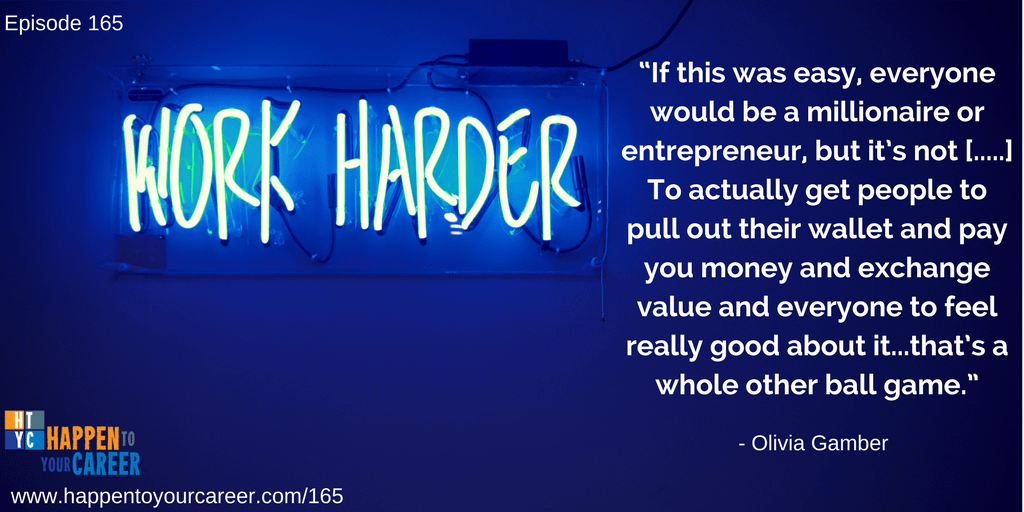Have you ever thought about building a business, but don’t know where to begin because you don’t have the time between your full-time job and your other personal obligations, like spending time with your family?
Today, we revisit a past episode that features a former client and now great friend of HTYC, Olivia Gamber. Olivia shares her story of how she took her side business and grew it into a full-time business career.
Also in the podcast, Olivia and Scott discuss some of the biggest takeaways they have encountered when they decided to grow each of their businesses. The discussion gets into everything from how to make the time to focus on building your side business, to becoming a business owner, and to how to validate your business as a real way to replace the income you bring in from your current job.
If you want to learn what first-time business mistakes to avoid when you start up, listen here!
BUILDING A BUSINESS: ABOUT OLIVIA GAMBER
Olivia is a return guest to the HTYC podcast. When she first came on the show, she had climbed the corporate ladder quickly and was the Manager of Talent and Organizational Development at Taylor Morrison. There she specialized in everything from strategy development and project management to process improvement and data analytics, she was also in charge of her company’s talent acquisition process from end-to-end! AND…at the time, she had used all of the knowledge and experience she’s gained in her journey to help other young professionals develop and advance their careers with OccupationalOlivia.com, a site all about “Next Level Career Success”!
Fast-forward to today and you’ll find that Olivia has grown what was once a side business to her full-time career. She took Occupational Olivia and partnered up to launch CareerAttraction, a space where high achievers are shown how to take their careers to the next level. At CareerAttraction, they have learned what it takes for you to stand out in this competitive market and get the respect, pay, and fulfillment you deserve.
WHAT YOU WILL LEARN
- Lessons about the “unmarketed” side of starting your own business – what works and what doesn’t
- Steps to take to regain control of your own time and invest in your future as a business owner
- How to measure success of your new business
- Helpful tips on how to evolve with your new business
- Best ways to gain knowledge on how to build a business

RELEVANT LINKS AND RESOURCES
Check out Olivia’s work at her website: Career Attraction
Follow Olivia on Facebook
Connect with Olivia on Linkedin
Follow Olivia on Twitter: @TheOliviaGamber
GET IN TOUCH WITH US!
Email: Scott@happentoyourcareer.com
Twitter: @htycbiz and @scottabarlow
Come join us over on Facebook in our Work You Love OneStop group!
LOVE THE SHOW? SUBSCRIBE TO THE HAPPEN TO YOUR CAREER PODCAST:
LEAVE US A REVIEW AND HELP US TO REACH MORE FOLKS JUST LIKE YOU AND HELP THEM “HAPPEN” TO THEIR CAREERS!
WANT HELP FINDING THE WORK THAT FITS YOU?
Are you at a point in your career where you find yourself asking, “Okay, now what?” Click on the link below to check out our FREE 8-day course to “Figure Out What you Really Want for Your Career!”

Ready for Career Happiness?
What Career Fits You?
Finally figure out what you should be doing for work
Join our 8-day “Mini-Course” to figure it out. It’s free!
Featured Episodes
View all episodes
April 17, 2017
174: Add Value, Grow Your Career with Michael Bigelow
IT’S ONE OF THOSE THINGS THAT THE LIKABILITY AND CONNECTION CERTAINLY DO HELP. BUT IT’S ONE OF THOSE THINGS THAT I REALLY DO FEEL THAT IT’S BOTH WHO YOU KNOW AND HOW YOU’RE CONNECTED TO THEM, AS WELL AS WHAT YOU KNOW. MICHAEL BIGELOW Whether you’re looking to make a lateral job transition to a […]
Listen Now

January 21, 2019
267: 3 Creative and Strategic Ways to Show Your Strengths to Interviewers
Everywhere you look these days, you can find articles sharing why focusing on your strengths is more valuable than improving your weaknesses. Using your signature strengths in your role means you can be energized instead of drained, engaged instead of bored, and successful instead of struggling. When it comes down to it, working in your […]
Listen Now









